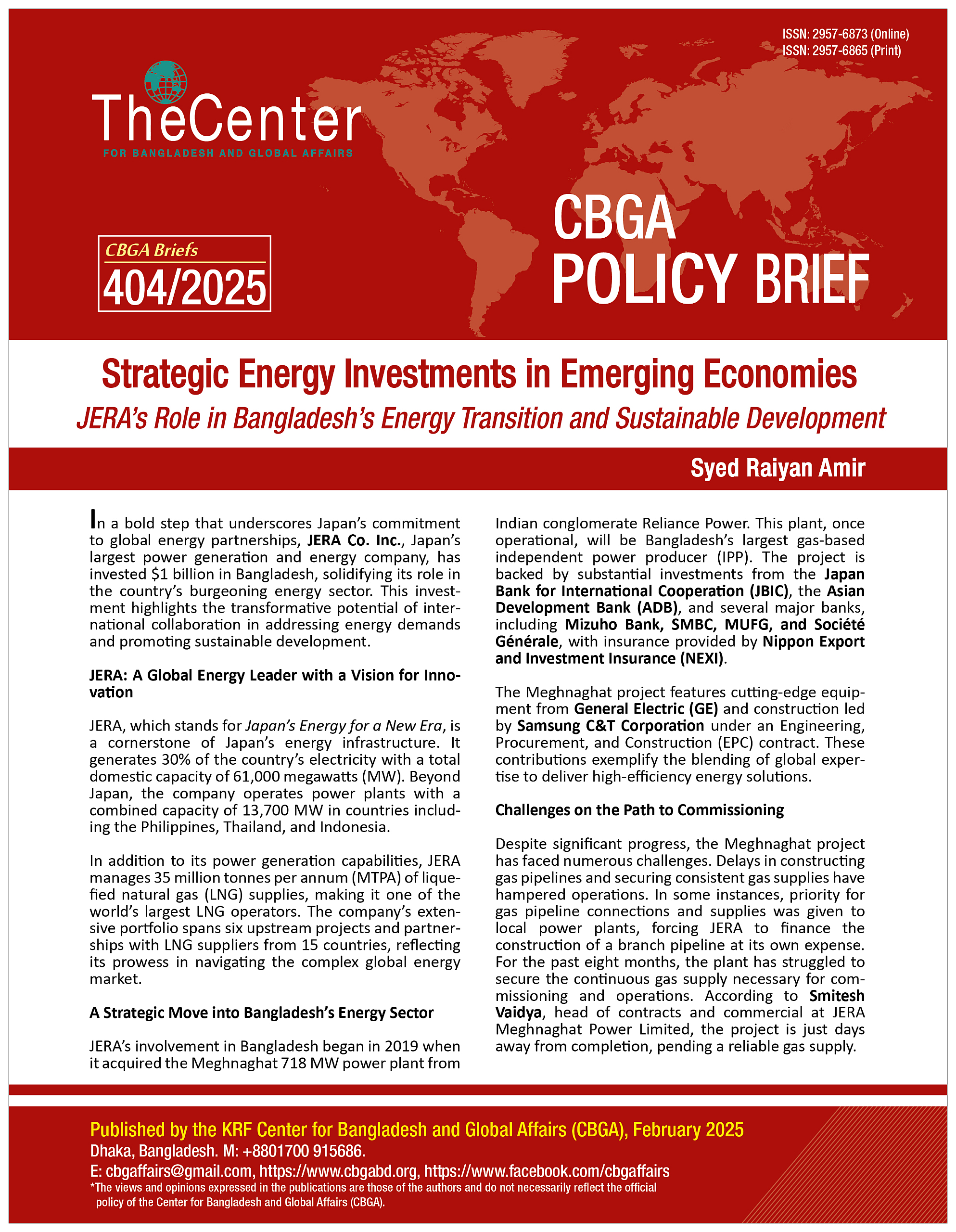
In a bold step that underscores Japan’s commitment to global energy partnerships, JERA Co. Inc., Japan’s largest power generation and energy company, has invested $1 billion in Bangladesh, solidifying its role in the country’s burgeoning energy sector. This investment highlights the transformative potential of international collaboration in addressing energy demands and promoting sustainable development.
JERA: A Global Energy Leader with a Vision for Innovation
JERA, which stands for Japan’s Energy for a New Era, is a cornerstone of Japan’s energy infrastructure. It generates 30% of the country’s electricity with a total domestic capacity of 61,000 megawatts (MW). Beyond Japan, the company operates power plants with a combined capacity of 13,700 MW in countries including the Philippines, Thailand, and Indonesia.
In addition to its power generation capabilities, JERA manages 35 million tonnes per annum (MTPA) of liquefied natural gas (LNG) supplies, making it one of the world’s largest LNG operators. The company’s extensive portfolio spans six upstream projects and partnerships with LNG suppliers from 15 countries, reflecting its prowess in navigating the complex global energy market.
A Strategic Move into Bangladesh’s Energy Sector
JERA’s involvement in Bangladesh began in 2019 when it acquired the Meghnaghat 718 MW power plant from Indian conglomerate Reliance Power. This plant, once operational, will be Bangladesh’s largest gas-based independent power producer (IPP). The project is backed by substantial investments from the Japan Bank for International Cooperation (JBIC), the Asian Development Bank (ADB), and several major banks, including Mizuho Bank, SMBC, MUFG, and Société Générale, with insurance provided by Nippon Export and Investment Insurance (NEXI).
The Meghnaghat project features cutting-edge equipment from General Electric (GE) and construction led by Samsung C&T Corporation under an Engineering, Procurement, and Construction (EPC) contract. These contributions exemplify the blending of global expertise to deliver high-efficiency energy solutions.
Challenges on the Path to Commissioning
Despite significant progress, the Meghnaghat project has faced numerous challenges. Delays in constructing gas pipelines and securing consistent gas supplies have hampered operations. In some instances, priority for gas pipeline connections and supplies was given to local power plants, forcing JERA to finance the construction of a branch pipeline at its own expense. For the past eight months, the plant has struggled to secure the continuous gas supply necessary for commissioning and operations. According to Smitesh Vaidya, head of contracts and commercial at JERA Meghnaghat Power Limited, the project is just days away from completion, pending a reliable gas supply.
“We have made significant progress and are close to commissioning,” Vaidya said. “With state-of-the-art facilities, highly efficient turbines, and competitive tariffs, the Meghnaghat project can significantly enhance Bangladesh’s power grid and ensure uninterrupted electricity supply”.
The Case for a Land-Based LNG Terminal
JERA’s vision for Bangladesh extends beyond the Meghnaghat plant. The company has expressed interest in establishing a land-based LNG terminal in Matarbari, a step that could revolutionize Bangladesh’s energy infrastructure.
Japan, a country prone to earthquakes and typhoons, operates 11 land-based LNG terminals that ensure stability and resilience in energy supply. Bangladesh, by contrast, relies on two floating storage and regasification units (FSRUs) in the Bay of Bengal. These floating terminals are vulnerable to disruptions caused by cyclones and other extreme weather events.
In 2024 alone, one of Bangladesh’s FSRUs was out of operation for over nine months, severely affecting gas supplies and underscoring the need for more reliable infrastructure. JERA’s land-based LNG terminal proposal is a timely solution that aligns with Bangladesh’s growing energy needs and climate resilience goals.
Expanding Horizons: Renewable Energy and Net-Zero Ambitions
JERA’s commitment to Bangladesh extends beyond LNG and gas-based power. In a letter to the government, the company outlined its interest in a broad spectrum of investments, including-
- Renewable energy projects, such as solar and wind power.
- Alternative energy solutions, including hydrogen and ammonia.
- Expanding LNG supply chains to support industrial growth.
The proposed investments could bring $2 to $3 billion in foreign direct investment (FDI) over the next 5 to 10 years. JERA also plans to establish a local office in Dhaka, signaling its long-term commitment to the country’s energy future.
From a sustainability perspective, JERA’s ambition aligns with Bangladesh’s aspirations for net-zero emissions. The company envisions partnerships with the government to promote renewable energy and implement innovative technologies that reduce carbon footprints, fostering a greener and more resilient energy landscape.
Bangladesh-Japan Partnership: A History of Trust and Growth
Japan has been one of Bangladesh’s most steadfast allies since the country’s independence in 1971. Over the decades, Japan has provided financial and technical support for numerous infrastructure projects, ranging from bridges and roads to power plants and ports.
JERA’s investment is a continuation of this legacy, reinforcing Japan’s role as a partner in Bangladesh’s journey toward economic growth and sustainable development. Through initiatives like the Meghnaghat project and potential LNG infrastructure upgrades, Japan’s contributions are shaping the future of Bangladesh’s energy sector.
Looking Ahead: Securing Bangladesh’s Energy Future
As Bangladesh seeks to expand its industrial base and improve the quality of life for its citizens, a robust and reliable energy supply is paramount. JERA’s investments in the Meghnaghat power plant and its vision for land-based LNG terminals and renewable energy development represent a critical step toward meeting these goals. Realizing this vision will require concerted efforts from all stakeholders. Government support, particularly in ensuring timely gas supply and infrastructure development, will be key to unlocking the full potential of these investments.
For Bangladesh, partnering with a global energy leader like JERA is more than an economic opportunity—it is a chance to build a resilient, sustainable, and inclusive energy future. By embracing innovation and fostering international collaboration, the nation is poised to emerge as a model for balancing growth with environmental stewardship. As the Meghnaghat project nears completion, it stands as a testament to what can be achieved through perseverance, partnership, and a shared commitment to progress. JERA’s journey in Bangladesh is just beginning, and its success could pave the way for a new era of energy excellence in the region.
– Syed Raiyan Amir is a Senior Research Associate at the KRF Center for Bangladesh and Global Affairs (CBGA).







